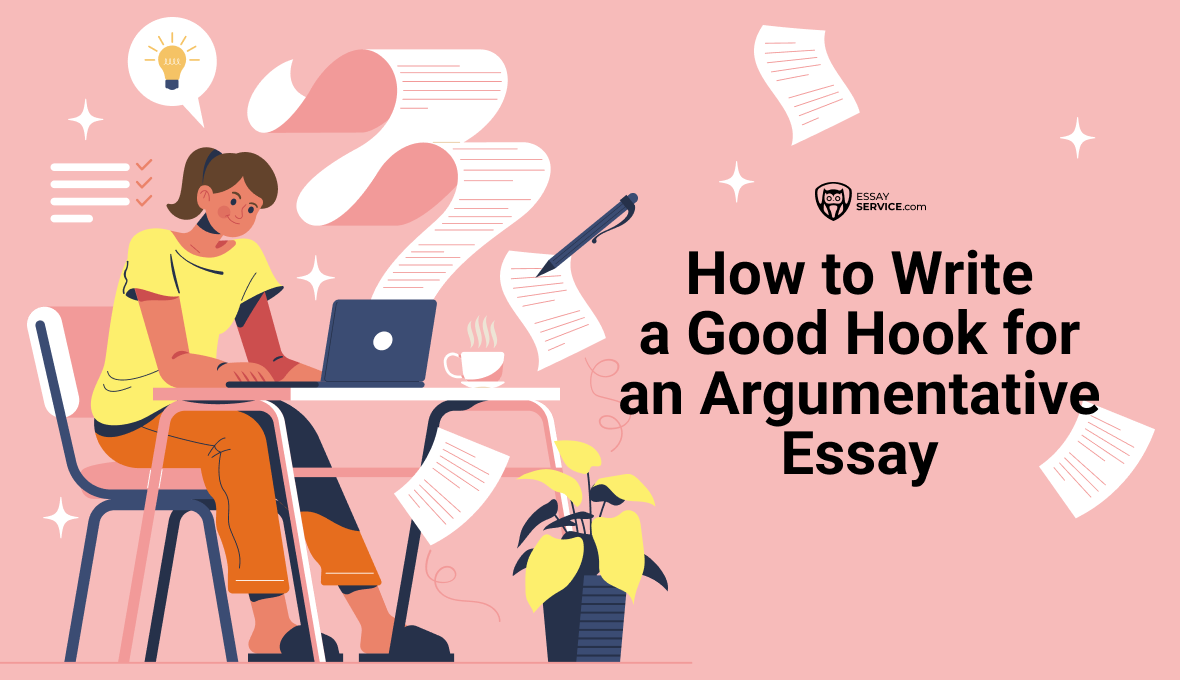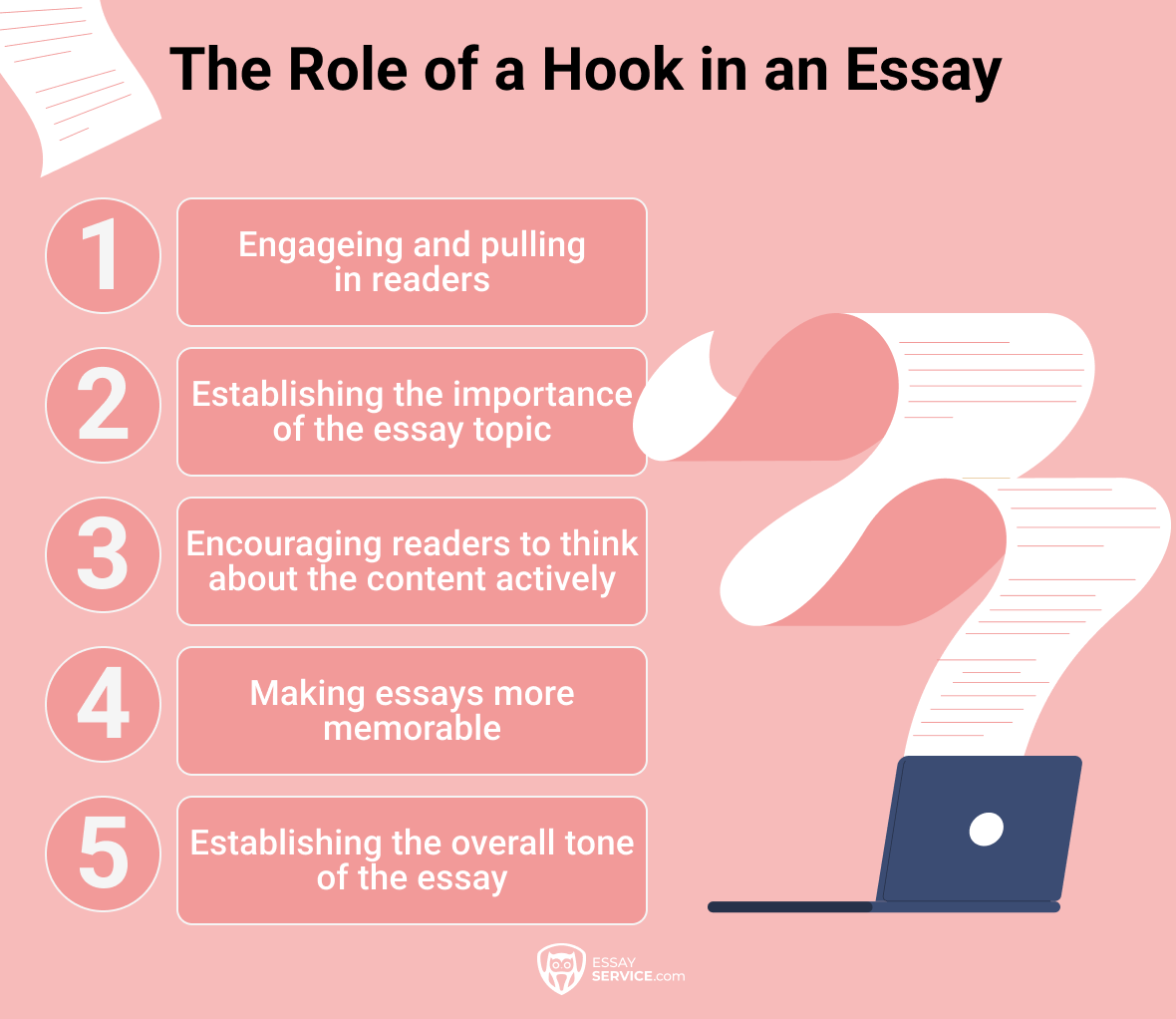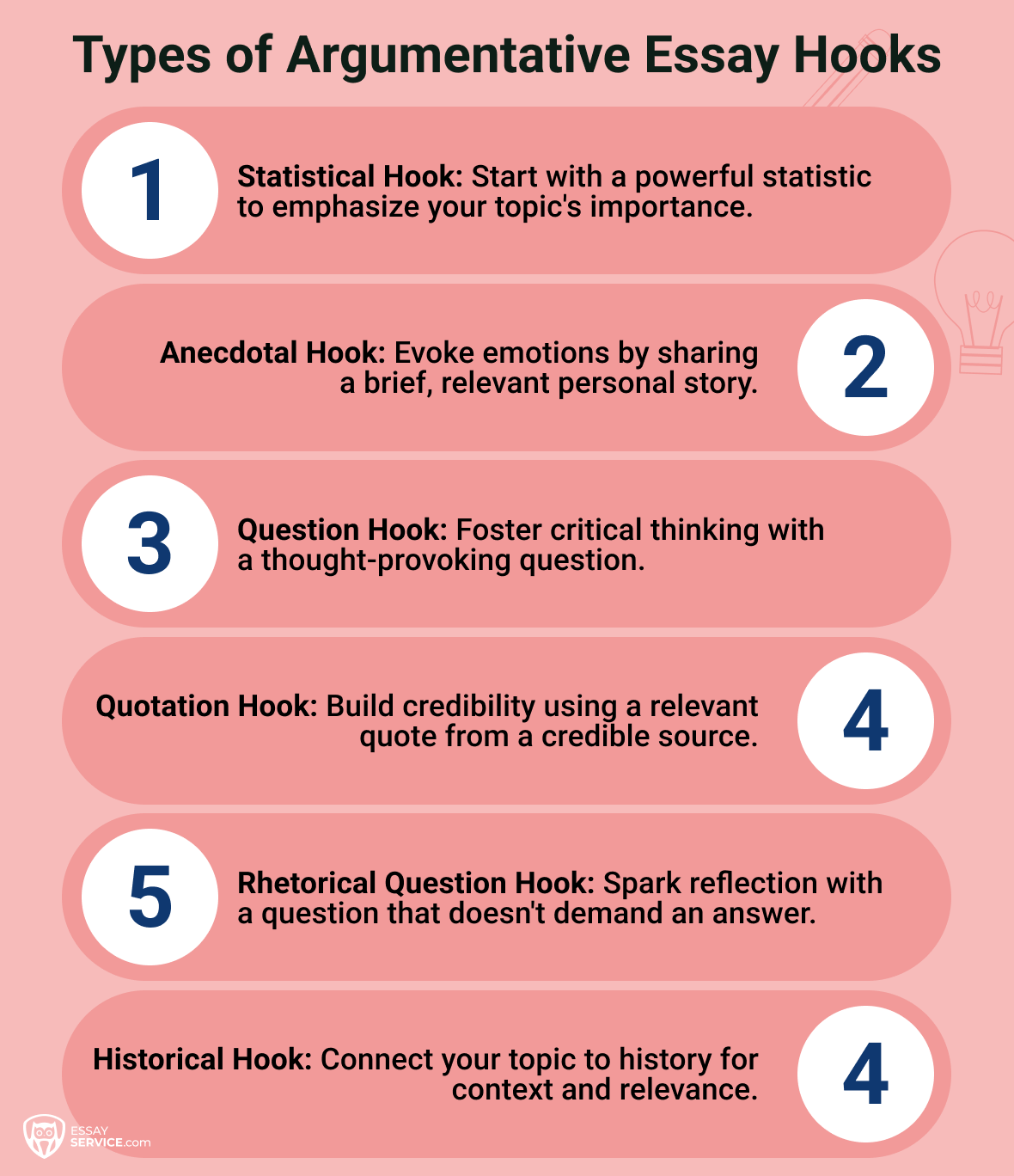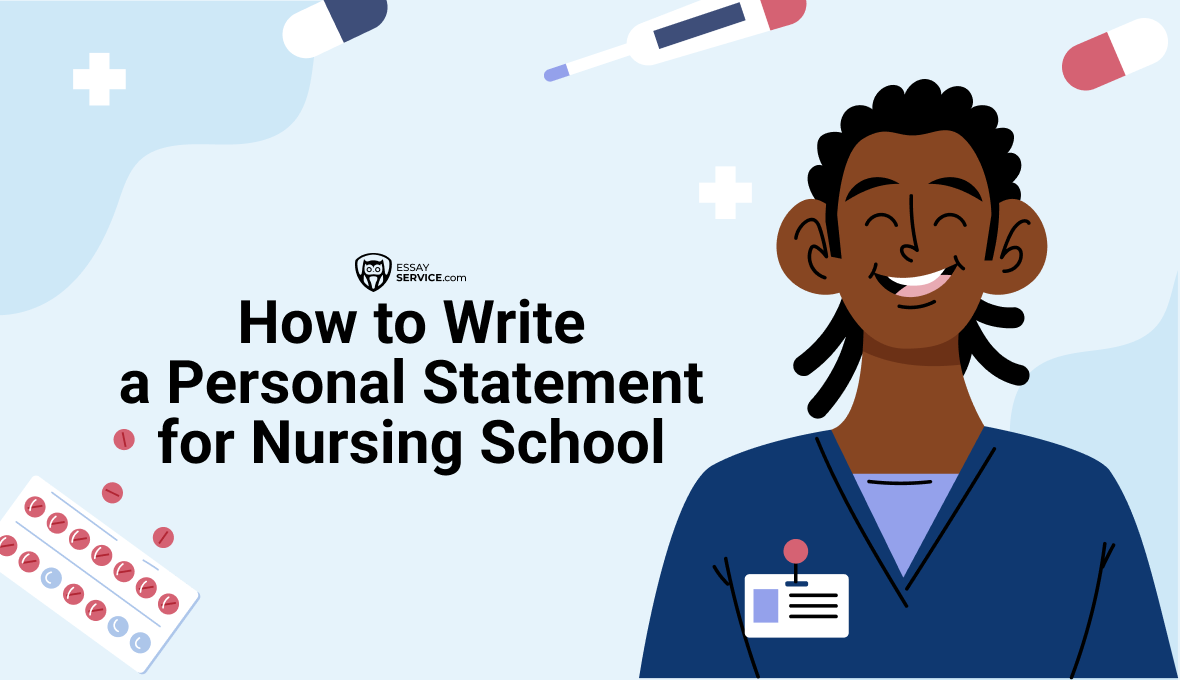
How to Write a Good Hook for an Argumentative Essay: Definition, Types, and Writing Tips
The opening of an argumentative essay often called the hook, is critical for grabbing your reader's attention and introducing the argument you'll be making. A strong hook can be achieved in a few simple ways: using a surprising fact, a thought-provoking question, or a relevant anecdote to spark the reader's interest.
Writing a hook for argumentative essay can take some practice. So, if you find yourself needing some extra help after reading this article, EssayService's argumentative essay writing service can offer specific guidance.

What Are the Types of Hooks for Argumentative Essay?
Different types of argumentative hooks can be employed based on the nature of the argument and the writer's objectives. Here are several types of hooks commonly used in argumentative essays:
1. Statistical Hook
Opening with a relevant and surprising statistic can immediately grab the attention. Statistics provide concrete data that supports the argument and establishes the topic's significance.
2. Anecdotal Hook
Sharing a short narrative or personal story related to the essay's topic can connect the audience and the argument. Anecdotes can evoke emotions and make the essay more relatable.
3. Question Hook
Posing an argumentative question can engage elocutionists and encourage them to think critically about the issue. Questions stimulate curiosity and invite the audience to consider different perspectives.
4. Quotation Hook
Using a relevant and impactful quote from a notable figure, expert, or source can lend credibility to the argument and provide a unique perspective.
5. Rhetorical Question Hook
Like the question hook, a rhetorical question doesn't necessarily require an answer but prompts lectors to reflect on the topic and consider the writer's viewpoint.
6. Historical Hook
Providing a historical context or referencing a significant event can help ground the argument and demonstrate its relevance in a broader context.

How to Write a Hook for an Argumentative Essay Step-by-Step?
Writing a good hook for an argumentative essay involves careful consideration of the topic, audience, and overall purpose of your essay. Here is a step-by-step guide to help you write an effective hook:
STEP 1 – Understand Your Audience: Consider your audience and what might capture their attention. Tailor your hook to appeal to their interests, values, or concerns.
STEP 2 – Define the Tone: Determine the tone of your essay – whether it's serious, humorous, or thought-provoking. Your hook should align with the tone you want to establish.
STEP 3 – Identify the Type of Hook: Choose a type of hook that best suits your argument and the nature of your essay. Options include statistical hooks, anecdotal hooks, question hooks, quotation hooks, rhetorical question hooks, and historical hooks, among others.
STEP 4 – Start with a Startling Statistic: If using a statistical hook, find a relevant and attention-grabbing statistic related to your topic. Make sure the statistics are credible and recent. E.g., "Did you know that approximately 1.3 billion tons of food are wasted globally each year, while millions go hungry?"
STEP 5 – Write an Engaging Anecdote: For an anecdotal hook, share a brief, gripping story or personal experience related to your argument. Create a vivid picture to capture the reciter's imagination. E.g., "In the small town where I grew up, the closing of the local library marked not just the end of a building but the loss of a community's intellectual heart."
STEP 6 – Pose a Thoughtful Question: If opting for an argumentative question hook, create a question that prompts reflection and curiosity. Consider the key issues your essay addresses. E.g., "Have we become so dependent on technology that we are sacrificing our ability to connect on a genuine, human level?"
STEP 7 – Introduce a Relevant Quotation: When using a quotation hook, select a quote that aligns with your argument and adds authority to your position. Attribute the quote to a credible source. E.g., "Albert Einstein once said, 'Imagination is more important than knowledge.' In today's education system, are we fostering the creativity needed for a rapidly changing world?"
STEP 8 – Write a Rhetorical Question: If using a rhetorical question hook, pose a question that doesn't require an answer but encourages the public to contemplate your argument. E.g., "Can we truly claim to have achieved equality when gender pay gaps persist in workplaces around the globe?"
STEP 9 – Provide a Historical Context: For a historical hook, connect your topic to a relevant historical event or period. Show how the past informs the present and supports your argument. E.g., "The echoes of the Civil Rights Movement still resonate in today's fight for social justice and equality."
STEP 10 – Revise and Refine: After crafting your hook, revisit it and ensure it aligns with the overall flow of your essay. Make any necessary revisions to enhance clarity, coherence, and impact.

Hook Examples for Argumentative Essay
Here are some more examples of writing effective hooks you can employ to begin your argumentative essay.
- Statistical Hook:
With over 90% of teenagers reporting daily use of social media, the impact of these platforms on mental health cannot be ignored. Are we nurturing a generation more connected online but increasingly isolated in reality?
- Anecdotal Hook:
As a single parent working two jobs, the struggle to provide nutritious meals for my children on a limited budget became a daily challenge. This personal journey reflects the broader issue of food insecurity faced by countless families in our society.
- Question Hook:
What if the key to unlocking economic growth lies not in cutting taxes for the wealthy but in investing in education and healthcare for all citizens? Could a more equitable society be the foundation for sustainable prosperity?
- Quotation Hook:
In the words of Winston Churchill, 'The price of greatness is responsibility.' As we grapple with the environmental challenges of our time, how can we, as a society, embrace our responsibility to protect the planet for future generations?
- Rhetorical Question Hook:
Is it possible to truly understand the impact of climate change without witnessing the shrinking ice caps, the raging wildfires, and the rising sea levels? Are we, as a global community, prepared to confront the consequences of our actions?
- Historical Hook:
In the aftermath of World War II, the Universal Declaration of Human Rights was established to ensure the protection of basic freedoms. How far have we come in upholding these principles, and what challenges persist in pursuing a just and equitable world?
Argumentative Essay Hooks by Subject
To capture the assembly's attention and set the stage for irresistible argumentative essays on various college subjects, consider the following hook examples:
Environmental Science:
In the delicate balance between economic progress and environmental conservation, the looming question persists: Can we sustain our way of life without compromising the health of our planet? The answers lie in exploring innovative solutions and redefining our relationship with the environment.
Political Science:
As the world witnesses unprecedented geopolitical shifts, the role of diplomacy in fostering global stability has never been more crucial. Are we on the brink of a new era of international cooperation, or are the seeds of discord sown too deeply to be overcome?
Psychology:
Exploring the labyrinth of the human mind unveils mysteries and challenges that redefine our understanding of consciousness. In delving into the complexities of mental health, are we ready to dismantle the stigmas surrounding psychological disorders and pave the way for a more compassionate society?
Economics:
In an era of growing income inequality, the economic landscape is a battleground of competing ideologies. Can we forge a path that reconciles the principles of capitalism with a commitment to social justice, or are we condemned to perpetuate a system that widens the gap between the haves and the have-nots?
Technology and Ethics:
As technology evolves at an unprecedented pace, the ethical dilemmas it presents become more intricate. Are we equipped to navigate the ethical challenges of artificial intelligence, biotechnology, and surveillance, or do we risk creating a future where our inventions outpace our humanity?
Sociology:
In the tapestry of society, the threads of inequality are woven deeply. Are we content to merely acknowledge the existence of systemic injustices, or can we actively engage in dismantling the structures that perpetuate discrimination and privilege?
Education:
As we reimagine the future of education, the question echoes: Can we transcend the traditional models and create an inclusive system that equips students with the skills needed to navigate an ever-changing world? The answer lies in challenging the status quo and championing a learner-centric approach.
Final Thoughts
A strong hook in argumentative essay makes your reader invested in your claim. Let's revise some strategies for writing it effectively:
- Starting with a surprising fact or statistic related to your topic can instantly pique the reader's interest.
- Planting a seed of doubt by posing a thought-provoking question that challenges the reader's existing beliefs and compels them to keep reading.
- Setting the scene with a concise, relevant anecdote and introducing your argument in a way that's both engaging and informative.
If you find writing a captivating hook challenging, don't be discouraged! EssayService's team of experts is always ready to provide tailored hooks to confidently launch your argumentative essay.
Frequently asked questions
What is a Hook in Argumentative Essay?
An argumentative essay hook is a sentence or question at the beginning of your essay that grabs the reader's attention and makes them want to read more. It sets the tone for your essay and provides a preview of what's to come. The hook is crucial for drawing readers in and encouraging them to engage with your argument.
What is a Good Hook for an Argumentative Essay?
A good hook for an argumentative essya is relevant to your topic and makes the reader curious. Examples include a surprising fact, a quote, a question, or a brief anecdote. It should be intriguing enough to make the reader want to continue reading. The best hooks also hint at the essay's main argument or theme.
How to Make a Hook in Argumentative Essay?
To make a hook in argumentative essay:
- Understand your audience.
- Choose a type of hook (fact, quote, question, etc.).
- Make sure it relates to your main argument.
- Keep it brief and engaging.
- Experiment with different hooks to see which one fits best with your essay.
- changed introduction;
- added conclusion;
- added FAQs.
New posts to your inbox!
Your submission has been received!
.png)


.webp)